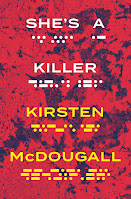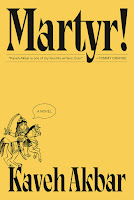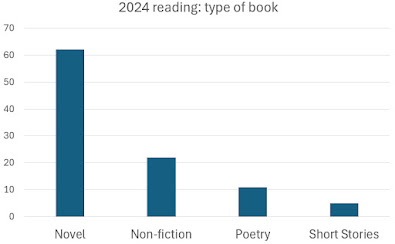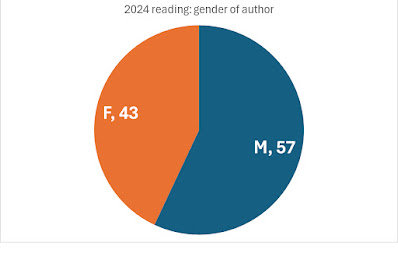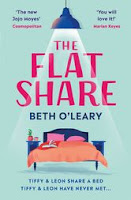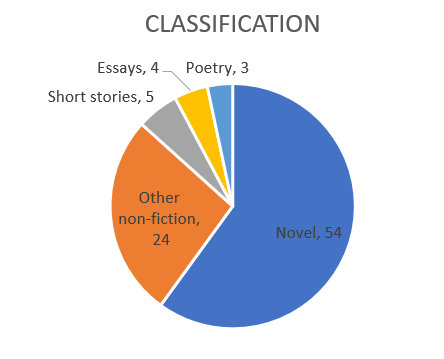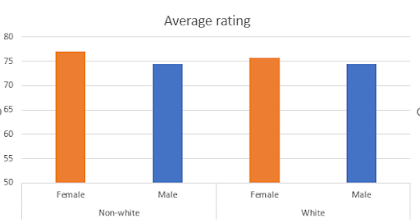I read 20 books that were released in 2024, but that's burying the lede. I actually read 100 books this calendar year, published between 1837 (The Pickwick Papers) and 2024.
One hundred.
One hundred.
This is the first time in tracking my reading here (see previous awards: 2023, 2022, 2021, 2020, 2019, 2018, 2017... 2014, 2013, 2012, 2011, & 2010) that I've cracked three figures.
The previous high was 90 in 2021.
I had five reading targets for the year, all of which I met, but there was no target for gross number of books.
How'd I do it? When you look at what format I consumed these books, the answer might seem to be through my ears...

I had five reading targets for the year, all of which I met, but there was no target for gross number of books.
How'd I do it? When you look at what format I consumed these books, the answer might seem to be through my ears...

But I actually listened to more audiobooks (85) in 2021. This is the first time in over a decade I've read as many physical books. Issues with my eyes (and attention span) aren't as bad as they were. Yay!
I've also been more ruthless with audiobooks, abandoning some early (these don't count towards the total and I won't drag anyone here) and moving onto books I'm more likely to devour.
Speak of which...
Best Reading of 2024
Outline by Rachel Cusk (2014)
If there's a theme for this year's top ten, it's clusters. This year I read five books by Cusk, and the Outline trilogy was an absolute highlight. The first book in the trilogy gets top billing here thanks to the thrill of seeing the magician pull the trick for the first time (autofiction with the merest silhouette of the author-narrator). Rather than diminishing marginal returns in the next two books, the power of Fay's self-abnegation only builds.
For more, check out my March/April consumption diary.
She's a Killer by Kirsten McDougall (2021)
Here's what I said about it in February:
Holy Moses this was great. This seems weird to say, and only just occurred to me several weeks after reading it, but it's like a grown-up Fight Club. The disaffection. The bifurcation. The sardonic wit. But without the empty nihilism and cheap shocks.
Looking back, this might've been the book that got me back into the physical form. So much good Aotearoa NZ stuff still isn't making it to audiobook.
Wellness by Nathan Hill (2023)
Here's what I said about it in July:
Wonderful. Part of me feels I shouldn't have loved it so much as it's lineage back through Jonathan Franzen is pretty clear (even without Oprah's seal of approval for Wellness), but it deals with things I'm interested in (and made me interested in things I wasn't previously) and feels big without being overblown or tryhard. Need to go back and read The Nix now.
Romantic Comedy by Curtis Sittenfeld (2023)
Here's what I said about it in April:
I'm a sucker for stories that immerse me in a world I was sort of interested in already but not obsessively so, like Saturday Night Live (which Sittenfeld repatches as The Night Owls in her novel). Pair this with a not-too-typical, not-too-out-there love story and you've got a winner.
The good test of a book like this, which is trying to have its genre cake and eat it too, is whether you can remember much of the plot or characters at the end of the year. This one absolutely passes this test. Memorable and smart. *Chefs kiss*
Martyr by Kaveh Akbar (2024)
Maybe this is recency bias, but Akbar claims the title of best book actually published-and-read in 2024 (just pipping James by Percival Everett, Good Material by Dolly Alderton, and Intermezzo by Sally Rooney).
Here's what I said about it in my December consumption diary:
This could be the start of a bad joke: Acclaimed poet writes a literary novel about death, religion, sexuality, loss, nationhood and lies... Except it fucking rules.The narrative hinges on a pretty incredible (as in: hard to believe, though not hard to predict) twist, and yet somehow it doesn't scuttle the whole enterprise.The most fun you can have while being miserable. Highly recommended.
Right Story, Wrong Story by Tyson Yunkaporta (2023)
First non-fiction on this list. First Australian. First first nations. Second book by Yunkaporta to make one of my year-end lists.Here's what I said about it in February:
A worthy successor to Sand Talk, but I'm worried I might come across as one of the wrong kind of fans of Yunkaporta's books (who Yunkaporta addresses in this latest book).Subsequently, I took part in an cross-discipline, online competition-cum-capacity-building-thingamee about indigenous perspectives on energy and climate change. Yunkaporta was one of the guest speakers and he was the same caustic, insightful, unserious-and-dead-serious-simultaneously self as presented in his (audio)books.
Skippy Dies by Paul Murray (2011)
Here's what I said about it in May:
Another book I was on the fence about reading (having already committed many hours to listening to the very good, but very Irish Franzen-y The Bee Sting already this year).Another book I ended up really enjoying. I think I preferred this to The Bee Sting because it's a bit less Franzen-y and because I myself have been grappling with a plot point not dissimilar to (not a spoiler, guys) Skippy dying!!!
Another fat book cluster. Unlike with Nathan Hill, I preferred Murray's earlier book to his newer one. It felt wilder. Less Seriously Funny Family Saga and more Stranger Things without the STRANGE THINGS (though there's plenty of lower case strangeness).
Big Swiss by Jen Beagin (2023)
Here's what I said about it in May:
Yeah! This was excellent. Funny, dark-at-times, possibly even profound. And it has dogs in it!I really liked that the protagonist/narrator was late 40s (I think) but language and ideas still seemed to be alive to them. It felt true(ish) to my inner dialogue as a early 40s person.Totally unrelated negative-impulse: I don't want to Google how old Elizabeth Bennett's parents are in Pride and Prejudice...
Nothing further to add, your honour. The Defence rests.
Companion Piece by Ali Smith (2022)
Here's what I said about it in October:The great Ali Smith keeps on being great in uncomfortable ways.It's incredible how much now-ness Smith gets into her books. You can pretty much lock in a slot in next year's list for Glif (and maybe it's companion piece, Glyph, if it comes out and I read it before the end of the year)... though I find the sight of the word 'Glif' very triggering as someone who often gets called Cliff in email, and occasionally Graig.
Poūkahangahatus by Tayi Tibble (2018)
I didn't write about thing about this in my December consumption diary because I hadn't actually read it before I left for Christmas up North, but I had it in my backpack and needed to read it to complete my goal of reading at least 10 single-poet collections this year.
It's crazy it took me six years to get to this collection. Crazy.
It's incredibly polished for a first collection published so young... annnnnnd this is where I stop myself from saying other condescending-sounding drivel.
This is the collection that convinced me that I need to read AT LEAST another ten poetry collections next year (with Tibble's sophomore effort top of the list).
Graphs and shit
A little more on how my 100 books breaks down... (sorry for the pixelation, for some reason posting graphs directly isn't working today).
Works in translation: 7
Works by non-white authors: 27
This gender split was interesting. Last year it was 35 female to 23 male authors, but going back to preceding years, 2024 looks pretty typical. Maybe it's because of the non-fiction I read? I read 19 non-fiction books by dudes and only 3 by females in 2024... Whereas with novels it was 34 females to 28 males.
Reading targets for 2025
- Read 100 books (why not?)
- Read at least 10 single-author poetry collections
- Read at least 20 physical books
- Read at least 10 non-fiction books by female authors
- Non-white + translated > 40

